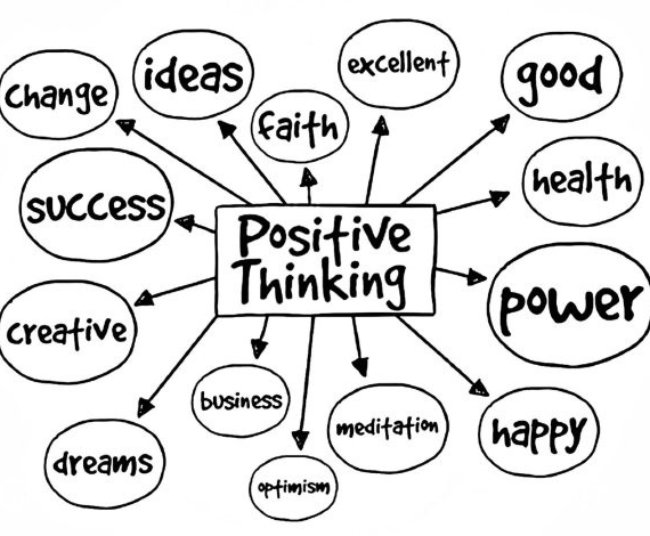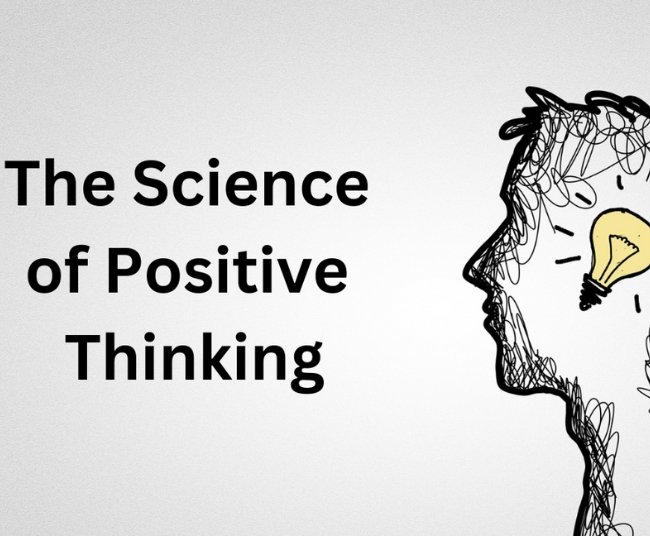Discover The Transformative Effects of The Power of Positive Thinking
Positive thinking is more than just a mental attitude; it’s a comprehensive approach to life that impacts every aspect of our existence. From improving mental and physical health to enhancing professional success and personal relationships.

The power of positive thinking can lead to transformative changes. But what exactly is positive thinking, and how can it be harnessed effectively?
What is Positive Thinking?

Positive thinking involves maintaining a constructive and optimistic mindset. It is the practice of focusing on the good in any given situation and expecting positive outcomes. This doesn’t mean ignoring reality or avoiding challenges; rather, it’s about approaching life’s difficulties with a hopeful and resilient attitude.
- Historical Perspectives on Positive Thinking
The concept of positive thinking is not new. It has roots in ancient philosophies and religious teachings that emphasize the power of the mind and the importance of maintaining a positive outlook. In modern times, positive thinking gained widespread attention through the work of Norman Vincent Peale, whose book The Power of Positive Thinking popularized the idea that a positive mindset can lead to success and happiness.
Benefits of Positive Thinking

- Mental Health Benefits
One of the most significant benefits of positive thinking is its impact on mental health. A positive mindset can reduce stress, anxiety, and depression. It helps individuals cope better with hardships and bounce back from setbacks more quickly. Positive thinking encourages a sense of well-being and boosts overall mental resilience.
- Physical Health Benefits
Positive thinking also has tangible effects on physical health. Studies have shown that optimists tend to have stronger immune systems, lower blood pressure, and a reduced risk of cardiovascular diseases. The correlation between a positive outlook and longevity has also been noted, with positive thinkers often leading healthier and longer lives.
- Professional Success and Positive Thinking
In the professional realm, positive thinking can be a game-changer. Optimistic individuals are more likely to set ambitious goals, take on challenges, and persist in the face of adversity. This resilience and proactive attitude often lead to greater career success and satisfaction. Positive thinking fosters creativity and problem-solving skills, which are invaluable in the workplace.
-
Personal Relationships and Positivity
Positive thinking plays a crucial role in personal relationships. Optimists tend to be more empathetic, understanding, and supportive, which strengthens their relationships. A positive attitude helps in resolving conflicts amicably and fosters a nurturing and harmonious environment in both personal and social circles.
Scientific Basis of Positive Thinking

-
Psychological Studies Supporting Positivity
Numerous psychological studies support the benefits of positive thinking. Research has demonstrated that positive thinkers experience lower levels of stress and are better equipped to handle difficult situations. Positive thinking promotes a healthier psychological state, which in turn influences overall life satisfaction.
-
Neuroscience and Positive ThinkinUg
Neuroscience has shed light on how positive thinking affects the brain. Positive thoughts stimulate the release of neurotransmitters like dopamine and serotonin, which are associated with feelings of happiness and well-being. This chemical response not only improves mood but also enhances cognitive functions, such as memory and problem-solving abilities.
Cultivating a Positive Mindset

- Daily Practices for Positivity
Cultivating a positive mindset requires consistent effort and practice. Simple daily habits can make a significant difference in developing a positive outlook. Starting the day with a positive affirmation, practicing mindfulness, and setting achievable goals are effective ways to nurture positivity.
- Affirmations and Positive Self-Talk
Affirmations and positive self-talk are powerful tools for fostering a positive mindset. Repeating positive statements about oneself can counteract negative thoughts and build self-esteem. Affirmations can be tailored to address specific areas of life, such as health, career, or relationships.
- Visualization Techniques
Visualization involves imagining positive outcomes and scenarios in vivid detail. This technique helps in creating a mental blueprint of success and can significantly enhance motivation and confidence. Athletes and successful professionals often use visualization to prepare for and achieve their goals.
- Gratitude Practices
Practicing gratitude is another effective way to cultivate positivity. Keeping a gratitude journal, where you regularly write down things you are thankful for, can shift your focus from what’s lacking to what’s abundant in your life. This shift in perspective promotes a sense of contentment and joy.
Overcoming Negativity

- Identifying Negative Thought Patterns
The first step in overcoming negativity is to identify and acknowledge negative thought patterns. These can include self-doubt, pessimism, and catastrophizing. Recognizing these patterns is crucial for addressing and transforming them into positive thoughts.
- Strategies to Counteract Negativity
Several strategies can help counteract negativity. Cognitive-behavioral techniques, such as reframing negative thoughts and practicing mindfulness, are effective in reducing negative thinking. Engaging in activities that bring joy and fulfillment also helps in shifting focus from negativity to positivity.
Positive Thinking in Different Life Aspects

- Positive Thinking in Personal Development
In personal development, positive thinking is a vital component. It encourages individuals to set and pursue meaningful goals, develop new skills, and strive for continuous improvement. A positive mindset fosters resilience and determination, essential qualities for personal growth.
- Professional Life and Career Growth
In the professional sphere, positive thinking can significantly impact career growth. Optimists are more likely to take initiative, embrace new opportunities, and persist through challenges. This proactive approach often leads to career advancement and job satisfaction.
- Enhancing Relationships with Positivity
Positive thinking enhances relationships by fostering empathy, understanding, and effective communication. It helps in building trust and resolving conflicts amicably. A positive attitude creates a supportive and harmonious environment in both personal and professional relationships.
- Health and Wellness through Positive Thinking
The impact of positive thinking on health and wellness is profound. It promotes healthy behaviors, reduces stress, and improves overall well-being. Positive thinkers are more likely to engage in regular exercise, maintain a balanced diet, and practice self-care, leading to better physical and mental health.
Case Studies and Real-Life Examples

- Success Stories of Positive Thinkers
There are countless success stories of individuals who have harnessed the power of positive thinking to overcome adversity and achieve their goals. From entrepreneurs to athletes, positive thinkers demonstrate how a constructive mindset can lead to remarkable achievements.
- Historical Figures and Positive Thinking
Historical figures like Mahatma Gandhi, Nelson Mandela, and Helen Keller exemplify the power of positive thinking. Their lives and accomplishments show how maintaining a positive outlook can drive change and inspire others, even in the face of tremendous challenges.
Challenges and Misconceptions

- Common Misconceptions about Positive Thinking
One common misconception about positive thinking is that it involves ignoring reality or denying negative emotions. However, positive thinking is about approaching challenges with a hopeful and resilient attitude, not about avoiding them.
- Challenges in Maintaining Positivity
Maintaining positivity can be challenging, especially in difficult times. It requires continuous effort and practice. Developing resilience, practicing mindfulness, and seeking support from others are essential strategies for sustaining a positive mindset.
Tools and Resources

- Books on Positive Thinking
Numerous books provide valuable insights into the practice of positive thinking. Titles like The Power of Positive Thinking by Norman Vincent Peale and The Magic of Thinking Big by David J. Schwartz offer practical advice and strategies for cultivating a positive mindset.
- Apps and Online Resources
There are several apps and online resources designed to help individuals practice positive thinking. Apps like Headspace, Calm, and Happify offer guided meditations, affirmations, and exercises to promote positivity.
- Positive Thinking Workshops and Seminars
Workshops and seminars on positive thinking provide interactive and immersive experiences to learn and practice positivity. These programs often include expert guidance, group activities, and practical exercises to reinforce positive thinking habits.
More About Positive Thinking
1. Positive Thinking and Emotional Intelligence
Emotional intelligence (EI) refers to the ability to recognize, understand, and manage our own emotions and the emotions of others. Positive thinking enhances EI by promoting a better understanding of our emotional responses and fostering empathy towards others. People with high EI are better equipped to handle stress, communicate effectively, and navigate social complexities. Practicing positive thinking helps in recognizing and regulating emotions, leading to improved interpersonal relationships and overall emotional well-being.
2. Positive Thinking and Stress Management
Stress is an inevitable part of life, but how we handle it can make a significant difference. Positive thinking helps reduce stress by shifting our focus from problems to solutions. When faced with stressful situations, optimists are more likely to view them as challenges to be overcome rather than insurmountable obstacles. This mindset reduces the physical and psychological impacts of stress, promoting a calmer, more focused approach to problem-solving and decision-making.
3. Positive Thinking and Physical Performance
Athletes and fitness enthusiasts often leverage the power of positive thinking to enhance their performance. Visualization and positive affirmations can improve focus, increase motivation, and boost confidence. By imagining successful outcomes and maintaining a positive mindset, individuals can improve their physical endurance and achieve their fitness goals more effectively. Positive thinking also helps in faster recovery from injuries by fostering a resilient and determined attitude.
4. Positive Thinking in Education
In the realm of education, positive thinking plays a crucial role in enhancing learning and academic performance. Students who maintain a positive outlook are more engaged, motivated, and resilient in the face of academic challenges. Positive thinking encourages a growth mindset, where students view failures as opportunities for learning rather than setbacks. This attitude fosters a love for learning, persistence, and better academic outcomes.
5. Positive Thinking and Creative Problem-Solving
Creative problem-solving requires an open and optimistic mindset. Positive thinking encourages individuals to explore new ideas, take risks, and think outside the box. Optimists are more likely to approach problems with a can-do attitude, which fosters innovation and creativity. By focusing on possibilities rather than limitations, positive thinkers can develop unique and effective solutions to complex problems.
6. Positive Thinking and Leadership
Effective leadership is often characterized by a positive and inspiring vision. Leaders who practice positive thinking are better at motivating their teams, managing stress, and navigating challenges. A positive leader fosters a supportive and optimistic work environment, which boosts team morale and productivity. Positive thinking also helps leaders make more balanced and forward-thinking decisions, contributing to the overall success of their organizations.
7. Positive Thinking and Financial Success
Financial success is not just about earning more money; it's also about managing finances wisely and making informed decisions. Positive thinking helps individuals set realistic financial goals, stay motivated, and overcome financial challenges. Optimists are more likely to seek out opportunities for growth and take calculated risks. A positive mindset also promotes a disciplined approach to saving and investing, leading to long-term financial stability and success.
8. Positive Thinking and Aging
Positive thinking can significantly impact the aging process. Seniors with a positive outlook on life tend to have better physical and mental health, greater life satisfaction, and longer lifespans. Positivity helps in coping with the challenges of aging, such as health issues and loss. By focusing on the joys of life and maintaining an active and engaged lifestyle, positive thinkers can enjoy a more fulfilling and vibrant life in their later years.
9. Positive Thinking and Community Building
Positive thinking extends beyond individual benefits to impact entire communities. Optimistic individuals contribute to a more supportive, cooperative, and vibrant community. Positive thinking fosters volunteerism, social cohesion, and mutual support. By promoting a culture of positivity, communities can address social issues more effectively and create a more inclusive and harmonious environment for all members.
10. Positive Thinking and Environmental Stewardship
Environmental stewardship requires a hopeful and proactive approach. Positive thinking encourages individuals and communities to take action towards sustainability and environmental conservation. Optimists are more likely to engage in eco-friendly practices, support green initiatives, and advocate for environmental protection. By focusing on solutions and the positive impact of their actions, individuals can contribute to a healthier and more sustainable planet.
11. Positive Thinking and Parenting
Positive thinking can significantly influence parenting styles and outcomes. Parents who maintain a positive outlook are more likely to foster a nurturing and supportive environment for their children. This approach encourages children to develop self-confidence, resilience, and a healthy self-esteem. By modeling positive behaviors and attitudes, parents can help their children learn how to cope with challenges, set realistic goals, and build strong, positive relationships.
12. Positive Thinking and Spirituality
For many, positive thinking is closely linked to spiritual well-being. Maintaining a positive outlook can deepen one’s spiritual practices and enhance a sense of inner peace and purpose. Positive thinking aligns with many spiritual teachings that emphasize gratitude, compassion, and faith in a higher power. This mindset helps individuals find meaning and fulfillment in their spiritual journeys, promoting overall well-being.
13. Positive Thinking and Social Media
In the age of social media, maintaining a positive outlook can be challenging but also incredibly rewarding. Positive thinking helps individuals navigate the often-negative landscape of social media with resilience and grace. By focusing on uplifting and inspiring content, practicing digital detoxes, and engaging in positive interactions, individuals can enhance their social media experience and protect their mental health.
14. Positive Thinking and Goal Setting
Setting and achieving goals is much easier with a positive mindset. Positive thinkers are more likely to set ambitious yet realistic goals and pursue them with determination. This mindset helps in visualizing success, overcoming obstacles, and staying motivated even when faced with setbacks. By maintaining a positive outlook, individuals can achieve their personal and professional goals more effectively.
15. Positive Thinking and Team Building
Positive thinking is essential for effective team building and collaboration. Teams led by positive thinkers tend to have higher morale, better communication, and increased productivity. A positive mindset fosters a collaborative environment where team members feel valued and motivated to contribute their best efforts. This leads to more innovative solutions and successful project outcomes.
16. Positive Thinking and Conflict Resolution
Conflicts are a natural part of any relationship, whether personal or professional. Positive thinking aids in resolving conflicts by promoting empathy, understanding, and effective communication. Optimists are more likely to approach conflicts with a solution-oriented mindset, seeking mutually beneficial outcomes. This approach reduces tension and fosters healthier, more harmonious relationships.
17. Positive Thinking and Cultural Awareness
Positive thinking can enhance cultural awareness and sensitivity. By maintaining an open and optimistic attitude, individuals are more likely to appreciate and respect cultural differences. This mindset promotes inclusivity and understanding, reducing prejudices and fostering more meaningful intercultural relationships. Positive thinking helps build a more inclusive and harmonious society.
18. Positive Thinking and Self-Care
Self-care is crucial for maintaining physical and mental health, and positive thinking plays a significant role in this practice. A positive mindset encourages individuals to prioritize their well-being and engage in activities that bring joy and relaxation. Whether it's through exercise, meditation, hobbies, or spending time with loved ones, positive thinking helps individuals recognize the importance of taking care of themselves.
19. Positive Thinking and Volunteerism
Positive thinking inspires individuals to give back to their communities through volunteerism. Optimists are more likely to engage in acts of kindness and support charitable causes. This mindset not only benefits the community but also enhances the volunteer's sense of purpose and fulfillment. By spreading positivity, volunteers can make a significant impact on the lives of others and contribute to a better world.
20. Positive Thinking and Innovation
Innovation thrives in an environment where positive thinking is encouraged. Optimists are more open to new ideas, willing to take risks, and capable of seeing opportunities where others see obstacles. This mindset fosters a culture of creativity and innovation, leading to the development of groundbreaking products, services, and solutions. By maintaining a positive outlook, individuals and organizations can drive progress and stay ahead of the curve.
Conclusion
The power of positive thinking is transformative, impacting every aspect of our lives from health and wellness to professional success and personal relationships. By cultivating a positive mindset through daily practices, affirmations, and gratitude, we can enhance our overall well-being and achieve greater life satisfaction. Despite challenges, maintaining positivity is a rewarding journey that leads to a more fulfilling and joyful life.
FAQs
Here are frequently asked questions about The Power of Positive Thinking:
1. How can positive thinking change your life?
Positive thinking can change your life by improving your mental and physical health, enhancing your professional success, and fostering better personal relationships. It promotes resilience, reduces stress, and encourages a proactive approach to life’s challenges.
2. What are some practical ways to practice positive thinking?
Practical ways to practice positive thinking include daily affirmations, gratitude journaling, visualization techniques, and mindfulness practices. Engaging in activities that bring joy and fulfillment also helps in cultivating a positive mindset.
3. Is positive thinking scientifically proven?
Yes, positive thinking is scientifically proven to have numerous benefits. Research in psychology and neuroscience has demonstrated that positive thinking can improve mental health, enhance cognitive functions, and promote overall well-being.
4. Can positive thinking improve physical health?
Positive thinking can improve physical health by reducing stress, lowering blood pressure, and boosting the immune system. Optimists are also more likely to engage in healthy behaviors, such as regular exercise and balanced nutrition, which contribute to better physical health.
5. How does positive thinking affect relationships?
Positive thinking affects relationships by fostering empathy, understanding, and effective communication. It helps in building trust, resolving conflicts amicably, and creating a supportive and harmonious environment in personal and professional relationships.
6. What are the challenges of maintaining a positive mindset?
Challenges of maintaining a positive mindset include dealing with stress, negativity, and setbacks. It requires continuous effort, resilience, and the use of strategies such as mindfulness, cognitive-behavioral techniques, and seeking support from others to sustain positivity.
What's Your Reaction?




















